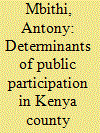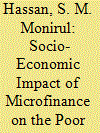|
|
|
Sort Order |
|
|
|
Items / Page
|
|
|
|
|
|
|
| Srl | Item |
| 1 |
ID:
163744


|
|
|
|
|
| Summary/Abstract |
The Constitution of Kenya 2010 introduced a framework for devolving public resources in Kenya’s forty-seven Counties. The Counties were given the responsibilities of maintaining health, roads and agriculture, among others. Using the Afrobarometer (2015) survey, we employ probit regression to examine the determinants of successful public participation in the Counties. We find that approval of the Governor’s performance has a positive and significant influence on public participation. However, difficulty among the citizenry in influencing County decision-making; lack of responsive County Assembly Members; difficulty in accessing information on County budgets, legislation and projects; and corruption in the Governor’s office have a negative significance.
|
|
|
|
|
|
|
|
|
|
|
|
|
|
|
|
| 2 |
ID:
163745


|
|
|
|
|
| Summary/Abstract |
The article explores the role of formal and informal institutions in influencing the representation of women in the two major political parties in Ghana – NDC (National Democratic Congress) and NPP (New Patriotic Party) – as well as the small party CPP (Convention People’s Party). Paradoxically, with its first president, Kwame Nkrumah (CPP), Ghana was one of the first countries in Africa to introduce a quota in 1959, reserving ten seats for women in Parliament. With a representation of 11% women after the election in 2012 and 13% after the election in 2016, however, Ghana has not been part of the positive development on the continent. Drawing on the body of literature on feminist institutionalism, the article explores the dynamics of power and change relating to the low representation of women in politics in Ghana. It further investigates responses to initiatives to promote more female candidates in Parliament – the reduction of filing fees and the introduction of women’s seats. The article argues that the formal institutions in the form of party structures work both as an obstacle and an opportunity to promote more women in politics, and that the informal structures in the form of the gender culture in Parliament and verbal abuse work against more women in politics.
|
|
|
|
|
|
|
|
|
|
|
|
|
|
|
|
| 3 |
ID:
163746


|
|
|
|
|
| Summary/Abstract |
Intra- and inter-regional migration is widely described. Prior studies have attribute varied reasons for this development including the quest for greener pastures and unequal development in northern Ghana. What has escaped critical scrutiny is some migrants’ ability to escape extreme rural poverty, albeit in harsh urban environment. Such a missing gap can potentiate high policy failures, hence the need for academic attention. Using a mixed method, we focus on two informal daily livelihoods as exemplars – exceptionalism – in Accra. We see their embedded organisational vitality and dynamic networks as illuminating for good livelihood practices, proper city governance and fostering economic empowerment. We call on city authorities to take cognisance of such complexities and heterogeneity of production–labour relations, failure of which can spell doom for policies ostensibly initiated to curb migration, as they are likely to be underpinned by factual inaccuracies and may result in ill-fated interventions.
|
|
|
|
|
|
|
|
|
|
|
|
|
|
|
|
| 4 |
ID:
163749


|
|
|
|
|
| Summary/Abstract |
This paper argues that changes in architectural practices related to the emergence of modern elites in the Mandara Mountains blur the relationship between them and the village’s permanent residents. Probably because they spend much of their time in urban cities, modern elites prefer building their main houses in those locations. Villagers interpret their behavior as a message of rejection. In turn, this interpretation significantly affects the reciprocal relationships between modern elites and the villagers. Although the former would built houses in the village also, this practice does not remove the suspicion they attract from the latter. On the contrary, the massive character of the houses combined with their emptiness contribute to reinforce the villagers’ belief that they are the fruit of occult practices. Relying on these observations, I argue that elites’ houses are not only the sites of production of social relations, as Claude Lévi-Strauss theorized, but they are also the site of tensions.
|
|
|
|
|
|
|
|
|
|
|
|
|
|
|
|
| 5 |
ID:
163742


|
|
|
|
|
| Summary/Abstract |
This study examined the association between health condition and conversion factors (i.e. environmental, individual and social) among workers in the ready-made garment (RMG) industry in Bangladesh. It used data gathered from a cross-sectional survey of 775 RMG workers in the Dhaka and Narayanganj districts. Using multiple logistic regression, the study found that: (1) achieving good health among RMG workers is hindered by various factors including high job-related demands, high noise levels, workplace crowding, heavy workloads, and low level of educational attainment; (2) job-related rewards and marital status have contributed to achieving good health; (3) health condition of workers is worse for women than for men; and (4) poor health condition is more prevalent among the oldest age group than in the lowest age category. The main contributions of this research: (1) this study develops a comprehensive framework to determine the factors affecting the health condition of manufacturing workers in general, and RMG workers in particular; and (2) it also examines the effects of both psychosocial and physical working conditions on the health of RMG workers.
|
|
|
|
|
|
|
|
|
|
|
|
|
|
|
|
| 6 |
ID:
163747


|
|
|
|
|
| Summary/Abstract |
Decentralization, as a policy option, has been on Ghana’s political agenda since independence. At the heart of Ghana’s current decentralization are the Metropolitan, Municipal and District Chief Executives (MMDCEs) who serve as the principal representatives of the President at the local level. This study explores the preferred institutional arrangements for selecting MMDCEs that will make Ghana’s decentralization process more effective and responsive to local needs. The study is designed as a representative nationwide sample survey in which 2104 randomly-selected adults of voting age were the subjects. The quantitative data was complemented with 20 elite interviews. The majority of respondents (74%) asserted that MMDCEs should be popularly elected as opposed to the current arrangement where MMDCEs are appointed by the President. Interestingly, the majority of the respondents do not want the election to be on a partisan basis.
|
|
|
|
|
|
|
|
|
|
|
|
|
|
|
|
| 7 |
ID:
163741


|
|
|
|
|
| Summary/Abstract |
Microfinance is considered to be the panacea for eradicating poverty from third-world society and this claim by non-government organizations (NGOs) is not unfounded. Evidence from Bangladesh reveals a partial success with respect to this viewpoint. Bangladesh is a poverty-ridden country; however, poor people in rural Bangladesh have shown significant material gains with regard to their lifestyles and it is no longer the case that they only have the bare minimum of food. Despite this significant improvement, it is still confusing as to whether these people have managed to cross the poverty line or not. Data show that poor people never stop borrowing money from the NGOs. The cycle of taking and retaking has made them dependent rather than independent agents in their society. With this viewpoint under consideration, this article seeks to explain the chronological sequence of events involved in taking credit. The ontological position of this study is interpretative in nature and such a position has allowed us to employ both observation and case studies as methodological tools for analysing our area of interest. Finally, this article argues that in order to understand the role of microfinance in Bangladeshi society, rethinking is required.
|
|
|
|
|
|
|
|
|
|
|
|
|
|
|
|
| 8 |
ID:
163743


|
|
|
|
|
| Summary/Abstract |
This paper interrogates the historical background to the diarchy system of rule in the Odomase traditional area in the Brong-Ahafo Region of Ghana. Relying on archival documents complemented by interviews, the research reveals that unlike chieftaincy forms in other traditional Ghanaian societies, the people of Odomase have a completely different practice in electing chiefs. The two royal houses have the endorsement of central government to elect two candidates to be installed concurrently as chiefs for the traditional area. The authors argue that the dual chieftaincy arrangement in Odomase, despite its seeming challenges, is the best solution to address the intractable conflict in the traditional polity of the area.
|
|
|
|
|
|
|
|
|
|
|
|
|
|
|
|
| 9 |
ID:
163748


|
|
|
|
|
| Summary/Abstract |
There is a prevailing opinion that, in almost every election, young people are the least likely to vote and these participation rates are continuously declining; youth membership of political parties is dropping (partisanship), they are less politically knowledgeable, do not participate in social or political activities, have low levels of political interest, and other factors. This research, conducted in the Kumasi Metropolis, shows that the youth are associated with political parties and thus provide a strong indication that the youth in Ghana are very active in politics and thus their engagement comes with factors that serve as a driving force.
|
|
|
|
|
|
|
|
|
|
|
|
|
|
|
|
|
|
|
|
|